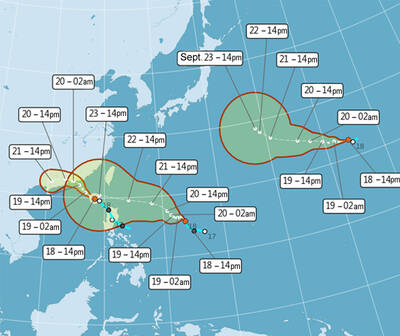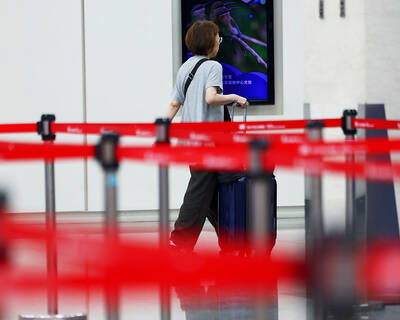A 40-year-old woman gave birth on Double Ten National Day, 111 days after the baby’s twin was lost in a natural miscarriage, Cathay General Hospital said yesterday.
The incident is a medical landmark in Taiwan for the longest interval between the birth of twins, as well as the longest length of pregnancy, Cathay General Hospital Obstetrics and Gynecology Department director Chen Li-chin (陳俐瑾) told a news conference in Taipei.
The woman surnamed Guan (關) had given birth to a girl conceived through in vitro fertilization (IVF) about six years earlier before deciding to implant two embryos to have another child, Chen said.

Photo: Lin Hui-chin, Taipei Times
However, the mother experienced a prelabor rupture of membranes causing one of the fetuses to be miscarried at 19 weeks gestation, while the other was kept after she was treated with potent antibiotics and cervical cerclage, also known as a cervical stitch, she said.
As the twins were fraternal with separate placentas and umbilical cords, the second child could be kept and developed in the mother’s womb, she said.
While 99 percent of twins are born within an interval of 24 hours, a delayed-interval delivery in twin pregnancies such as Guan’s case is rare, with only 82 such cases recorded globally, indicating a success rate of less than 0.01 percent, Chen said.
Globally, delayed intervals average 20 to 60 days, with a record high of 154 days in Portugal, she added.
The incidence of preterm births in Taiwan has risen to 10.8 percent last year from 8.5 percent in 2006, mostly likely because of the increased percentage of twins conceived through IVF and pregnancy at advanced maternal ages, she said.
Women of advanced maternal age who are pregnant with twins are advised to be aware of uterine contraction and have their cervical length measured at 16 to 24 weeks of gestation during the second trimester, she said.
They should promptly go to the hospital if they experience symptoms of preterm labor, such as bleeding, uterine contraction and their water breaking, Chen added.

NEW AGREEMENT: Malaysia approved imports last year after nearly two years of negotiations and inspections to meet quarantine requirements, officials said Up to 3.6 tonnes of pomeloes from Taiwan cleared Malaysian customs on Friday, in the first shipment of Taiwanese pomeloes to Malaysia. Taiwan-grown pomeloes are popular in domestic and overseas markets for their tender and juicy taste, the Ministry of Agriculture’s Animal and Plant Health Inspection Agency said. The fruit is already exported to Japan, Canada, Hong Kong, Singapore and the Philippines, it added. The agency began applying for access to the Malaysian market in 2023, compiling data on climate suitability, pests and diseases, and post-harvest handling, while also engaging in nearly two years of negotiations with Malaysian authorities and submitting supplementary

PEAK MONTHS: Data showed that on average 25 to 27 typhoons formed in the Pacific and South China seas annually, with about four forming per month in July and October One of three tropical depressions in the Pacific strengthened into a typhoon yesterday afternoon, while two others are expected to become typhoons by today, Central Weather Administration (CWA) forecaster Lee Ming-hsiang (李名翔) said yesterday. The outer circulation of Tropical Depression No. 20, now Typhoon Mitag, has brought light rain to Hualien, Taitung and areas in the south, Lee said, adding that as of 2pm yesterday, Mitag was moving west-northwest at 16kph, but is not expected to directly affect Taiwan. It was possible that Tropical Depression No. 21 would become a typhoon as soon as last night, he said. It was moving in a

Tigerair Taiwan and China Airlines (CAL) today announced that several international flights were canceled or rescheduled due to Typhoon Ragasa. The Central Weather Administration (CWA) has maintained sea and land warnings for the typhoon. Its storm circle reached the Hengchun Peninsula (恆春半島) on Taiwan's southern tip at 11am today. Tigerair Taiwan said it canceled Monday's IT551/IT552 Taoyuan-Da Nang, IT606/IT607 Taoyuan-Busan and IT602 Taoyuan-Seoul Incheon flights. Tomorrow, cancelations include IT603 Seoul Incheon-Taoyuan, as well as flights between Taoyuan and Sapporo, Osaka, Tokyo Narita, Okinawa, Fukuoka, Saga, Tokyo Haneda, Nagoya, Asahikawa and Jeju. On Wednesday, the IT321/IT322 Kaohsiung-Macau round-trip would also be canceled. CAL announced that today's

About nine Taiwanese are “disappeared,” detained, or otherwise deprived of freedom of movement in China each month, the Mainland Affairs Council (MAC) said yesterday. Between Jan. 1 last year and Aug. 31 this year, 188 Taiwanese travelers went missing, were detained and interrogated, or had their personal freedom restricted, with some questioned in airports or hotel lobbies, the council said. In a statement ahead of the Mid-Autumn Festival, the council urged people visiting China for any reason to be highly vigilant and aware of the risks. Of the reported cases, 50 people were “disappeared” after entering China, 19 were detained and 119 had